AMERICAN MOTORCYCLIST August 2019
Get Experienced
Community Garages Connect Riders To Fix Bikes
By Michael Marino
Community Garage Facts
- Community garages are shared workspaces where you can work on your bike.
- These are organized as informal groups, nonprofit organizations and for-profit companies.
- The environment offers opportunities to mentor others and learn yourself.
- Members and customers can learn more about the motorcycling lifestyle and how to maintain and repair bikes.
- Community garages empower individuals and groups to ride.
- Most garages include a social component allowing members to hang out and make friends.
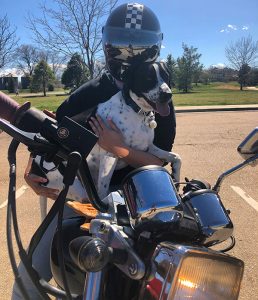
Filthy Friday community garage member Jen Wyse
In August 2016, Jen Wyse moved to Colorado from New York City to get closer to nature and fresh air. Motorcycling was part of her plan, and she had just bought her first bike, a 1984 Honda VT500 Shadow, after taking a riding course.
Like many three-decade-old motorcycles, the Shadow was far from like-new condition.
“The bike came with a few quirky personality traits that needed some fine-tuning,” she remembered.
A friend gave her a tip: Check out the Filthy Friday bike night. There, her friend said, she could meet other riders and get some help prepping her motorcycle.
“I was drawn to it, because I didn’t have much experience—besides DIY YouTube videos—fixing motorcycles, and it was a great opportunity to spend time with people I could learn from,” Wyse wrote in an email.
But YouTube can only do so much.
“They were able to help me troubleshoot an overheating, faulty fan issue and get my bike back on the road,” she added.
But more important than that, she expanded her circle of trusted riding friends, meeting “so many great people through being a community garage member.”
“I also found it pretty rad that there were a lot of women attending Filthy Friday,” she added. “And it was great to see them encouraging each other.”
Wyse is one of the thousands of new riders across the country whose first steps into the motorcycling lifestyle have been helped by community garages.
The desire to ride often begins with an idea—sparked by an image in a magazine, a video online or a story told. This is stoked by experience and ignited by knowledge. We learn to ride, to gear up and to maintain our machines.
Other people can empower us in this process. Community garages are one way experienced riders are doing just that—teaching new riders about the motorcycling lifestyle and mentoring them on maintaining and repairing their bikes.
What Is A Community Motorcycle Garage?
While the location and physical size of community garages vary widely, one commonality among them is emphasis on a shared, inclusive space for motorcycling enthusiasts.
Skidmark Garage in Cleveland, Ohio, is based in a 10,000-square-foot space. It offers members storage for their motorcycles, 11 work bays and access to tools. There are no set hours of operation, and members come and go as they please.
Skidmark Garage has about 45 members, with fees of $150 a month.
There are discounts for half-year or full-year memberships. Hourly memberships also are available for those who only need work space occasionally.
Some community garages are less formal, like the Filthy Friday crowd in Denver, Colo. The group of about 60 people lacks its own workspace.
It charges no membership fee and uses borrowed shop space each week to complete as much work on member’s motorcycles as possible.
Other community motorcycle garages exist somewhere in between. Re-Cycle Garage in Santa Cruz, Calif.—founded by 2019 Friend of the AMA Award winner Liza Miller—meets once a week on Sundays to wrench bikes and record the Motorcycles & Misfits podcast.
The only cost to participants is $1 for disposing of used oil.
These community motorcycle garages all emphasize wrenching as a group.
“The two most common traits of most community motorcycle garages are shared resources (tools and space) and a culture of helping one another,” Skidmark Garage Owner Brian Schaffran said. “Every community garage has its own personality, rules, and hours. They really are as unique as their owners, who are by and large interested in supporting riders and keeping our motorcycle lifestyle thriving.”
For Filthy Friday group leader Andrew Raitz, the work he puts in pays off when he sees members pull together to help each other further their passion for motorcycling.
“A community garage can foster positive connections that uplift and empower individuals by sharing the tools and knowledge necessary to ride and maintain their own motorcycles,” Raitz said. “They are one of the most effective ways to ensure motorcycles are made available to anyone with an interest.”
What Is A Community Motorcycle Garage?
While the location and physical size of community garages vary widely, one commonality among them is an emphasis on a shared, inclusive space for motorcycling enthusiasts.
Skidmark Garage in Cleveland, Ohio, is based in a 10,000-square-foot space. It offers members storage for their motorcycles, 11 work bays and access to tools. There are no set hours of operation, and members come and go as they please.
Skidmark Garage has about 45 members, with fees of $150 a month.
There are discounts for half-year or full-year memberships. Hourly memberships also are available for those who only need workspace occasionally.
Some community garages are less formal, like the Filthy Friday crowd in Denver, Colo. The group of about 60 people lacks its own workspace.
It charges no membership fee and uses borrowed shop space each week to complete as much work on member’s motorcycles as possible.
Other community motorcycle garages exist somewhere in between. Re-Cycle Garage in Santa Cruz, Calif.—founded by 2019 Friend of the AMA Award winner Liza Miller—meets once a week on Sundays to wrench bikes and record the Motorcycles & Misfits podcast.
The only cost to participants is $1 for disposing of used oil.
These community motorcycle garages all emphasize wrenching as a group.
“The two most common traits of most community motorcycle garages are shared resources (tools and space) and a culture of helping one another,” Skidmark Garage Owner Brian Schaffran said. “Every community garage has its own personality, rules, and hours. They really are as unique as their owners, who are by and large interested in supporting riders and keeping our motorcycle lifestyle thriving.”
For Filthy Friday group leader Andrew Raitz, the work he puts in pays off when he sees members pull together to help each other further their passion for motorcycling.
“A community garage can foster positive connections that uplift and empower individuals by sharing the tools and knowledge necessary to ride and maintain their own motorcycles,” Raitz said. “They are one of the most effective ways to ensure motorcycles are made available to anyone with an interest.”
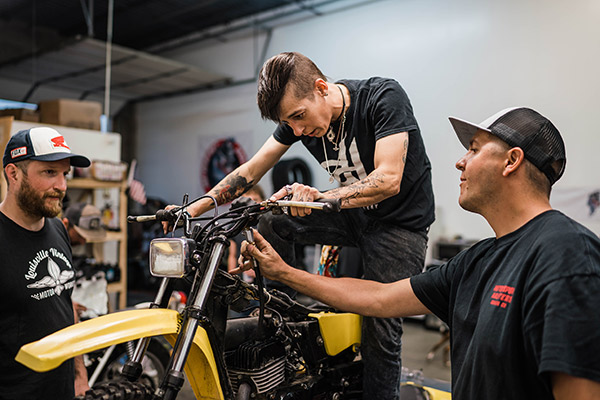
Filthy Friday member Amanda Steele (middle) and Mike Noone (right) peform a compression test. F Filthy Friday member Andrew Wagner does some carb cleaning at a garage night.
The History
The concept of a community shop space is not new.
Schaffran said he was aware of community motorcycle garages in San Diego, Calif., and British Columbia, Canada, when he opened Skidmark Garage in 2015. He also was aware of some automotive co-ops. And he knew the U.S. military operates shops on some of its bases where personnel can work on their vehicles.
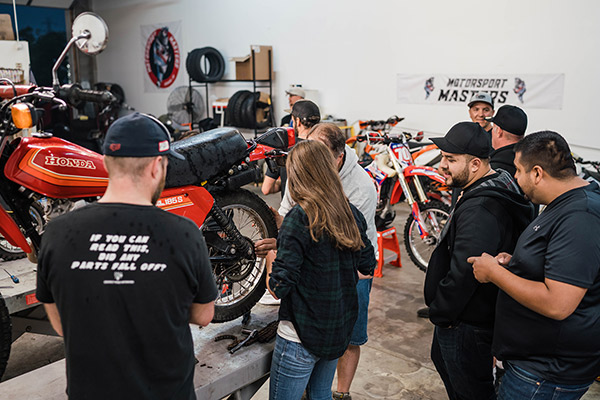
At Filthy Friday garage nights, everyone is expected to pitch in on the night’s projects.
“My original idea in 1995 was for cars—to have a dozen lifts where people could put their cars up, get underneath them and do any work that needed to be done,” he said. “Once I really got into motorcycles years later, I realized that a community garage for bikes was way more feasible.”
For Miller, the concept developed more organically.
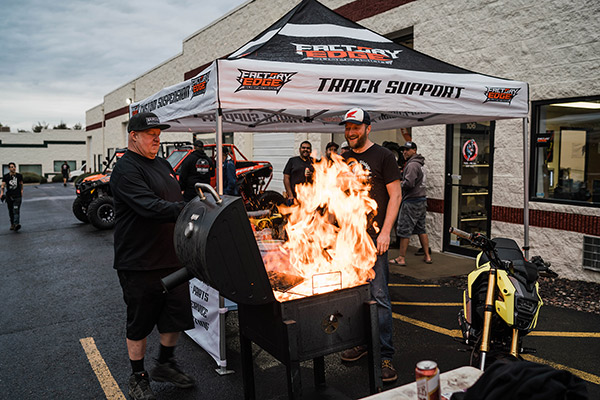
Filthy Friday organizer Andrew Raitz (right) gets the grill fired up at a Filthy Friday garage night event
“My understanding is that it came out of the makerspace and the new generation that wants to fix and build things,” she said. “I don’t think I knew of any before opening mine (in 2009). This started as a concept for me.”
Miller and Schaffran were Raitz’s inspirations for starting the Filthy Friday group, as well as his experience as a community motorcycle garage member in Louisville.
“Seeing the extremely supportive motorcycle group in my Kentucky hometown, Louisville Vintage Motorworks, essentially form out of somebody’s garage was the first experience I had with the makings of a motorcycle community,” he said. “After I moved to Colorado, I wanted to bring the positive experience from that group to the Denver community.”
Today, www.communitymotorcyclegarages.com lists 21 U.S.-based community motorcycle garages operating in 12 states.
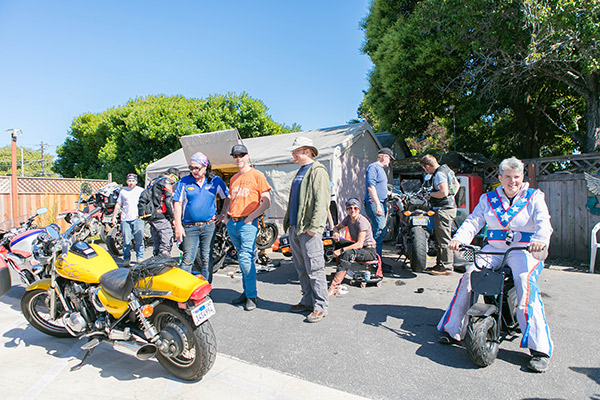
The Re-Cycle Garage group meets on Sundays at organizer Liza Miller’s home garage. Most community garages pride themselves on accepting members from all backgrounds and walks of life.
Why Join?
The benefits of joining a community motorcycle garage vary from person to person.
One of the more empowering benefits is access to workspace and tools. Some riders lack a space where they can work on their machines, or they are restricted by landlords or homeowners associations. And some riders who may have the space lack the finances.
Then there are those who are new to motorcycling who may be hesitant to spend hundreds of dollars on the tools and equipment needed for motorcycle maintenance.
Community garages offer access to the needed tools in a work space specifically designed for motorcycles.
Some community garages also provide a secure space for members to store their motorcycles, which gives peace of mind.
Another benefit is the community itself.
“Some days, I come to the shop without anything to really work on,” said Skidmark member Dave Foster. “Being a part of the Skidmark community means you take ownership and pride in the shop. You also share in the highs and lows of motorcycle repair. Hearing someone’s bike start for the first time after an eight-month build gives you goosebumps. Hearing a knock in a piston, you have shoulders to cry on.”
Some motorcycle maintenance tasks require two or more sets of hands, and more experienced members may have tips or tricks to share that make maintenance tasks easier.
“People are laughing, smiling, and helping each other,” said P.J. Grakauskas, another member of Skidmark Garage. “We haul each other’s bikes to events, pick up new projects, fix issues and, overall, just act as one big cohesive moto family.”
Experienced riders can help diagnose problems and perform complex repairs.
“As a member, you are expected to help everyone, and everyone is expected to help you,” Schaffran said. “If you are the type who can’t accept help and don’t want to help others, you don’t stick around very long.”
Schaffran said he’s fortunate to have members with a wide range of experience at Skidmark Garage, from experienced mechanics and millwrights to those who start by learning, “tighty righty, lefty loosey.”
“Nobody’s ride gets laughed at or made fun of,” he said. “Our motto is, ‘All are welcome who welcome all.’ If you can’t handle working next to someone who lives a totally different lifestyle than yours, you don’t get to join. We pride ourselves with a membership that encompasses all walks of life.”
For Miller, mentorship is one of the core benefits of joining the Re-Cycle Garage bunch.
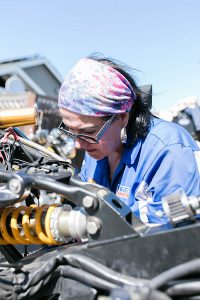 “First off, it’s fun to have others around when wrenching,” she said. “But, mostly, I think it’s important to give the new generation of riders support and mentorship. I created the space I wish I’d had available to me when I was younger.”
“First off, it’s fun to have others around when wrenching,” she said. “But, mostly, I think it’s important to give the new generation of riders support and mentorship. I created the space I wish I’d had available to me when I was younger.”
Raitz’s group is fortunate to have several members who have ample mechanical experience.
“A lot of our core group is very mechanically inclined, so there is never a shortage of someone able to help a novice,” he said. “We do attract a very novice group of riders searching for community and mechanical support.”
The membership in community motorcycle garages is often a diverse one.
At Skidmark Garage, members represent several generations of motorcyclists.
“The average age is in the early 30s, but the youngest is a junior in high school and the oldest is a 75-year-old who just wants to continue learning and tinkering,” Schaffran said.
While Raitz estimates that the majority of his members are in their early 30s, his group includes members as young as 23 and older than 55.
Re-Cycle Garage has a diverse membership that represents its Santa Cruz, Calif., roots.
“We are gay, straight, bi, trans, Asian, white, tall, short, female, male, redheads, champions and newbies,” Miller said. “We really cover it all.”
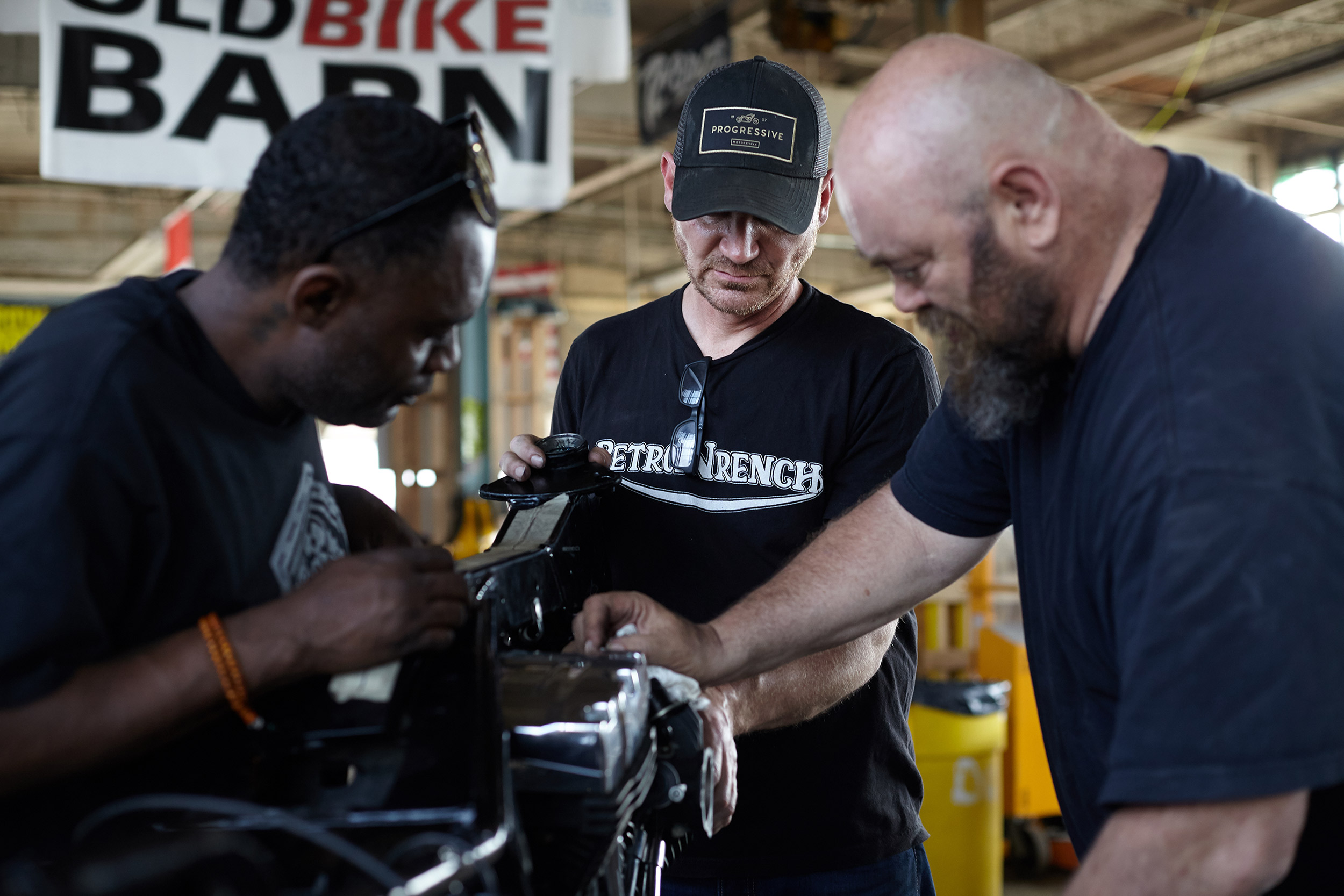
Skidmark Gargae founder Brian Schaffran (center) works with two other garage members on a motorcycle engine project.
More Than Mechanics
Community motorcycle garage members also get to take part in events like weekend group rides.
Raitz’s group puts on Sunday brunch rides, as well as several other events.
“We also have an annual motorcycle outing to Lakeside Amusement Park, which was built in 1903,” he said. “Possibly one of the more notable activities we organize is the Dumb & Dumber Ride, which is a 200cc or less motorcycle ride over Independence Pass in Colorado.”
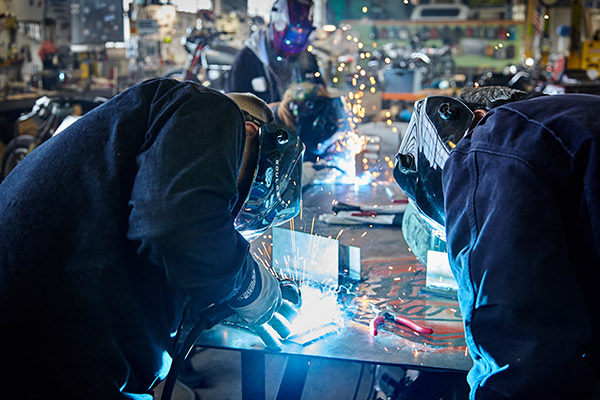
Skidmark Garage’s large, permanent shop space allows its members to use a wide range of tools, including welding equipment.
Skidmark Garage puts on a variety of events within its shop space, including instructional classes that range from motorcycle maintenance 101 to MIG welding. It also has hosted fundraisers, concerts and comedy nights.
Miller said Re-Cycle Garage recently held a minibike precision riding class for its members. The groups also hosts quiz nights to help members stay fresh on motorcycle maintenance topics.
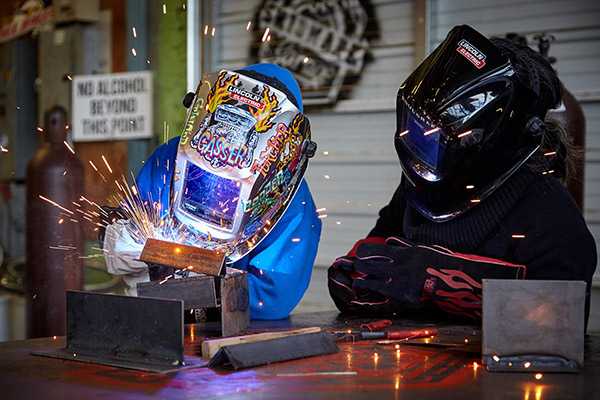 “Probably the best thing is the free gear room,” Miller said. “We take in donated gear from people who have extra, and we give it away to new riders.”
“Probably the best thing is the free gear room,” Miller said. “We take in donated gear from people who have extra, and we give it away to new riders.”
Challenges
Operating a community space isn’t without its difficulties. There is a need for rules and standards to ensure everyone gets the most out of the experience. Inevitably, conflicts arise, and it is up to each garage organizer/owner to try to keep peace and maintain order.
“Personalities are always going to be a challenge,” Raitz said. “As an organizer, I find that it is a lot easier to diffuse a disagreement or conflict over a motorcycle than a similar clash revolving around another subject.”
Miller has just a few core rules.
“Number one, don’t put your stuff on chairs. They are for sitting,” she said. “Number two, if you break it or use it up, replace it. Sometimes tools go missing or get broken, but more tools are donated. I’d say the worst thing is taking out the garbage.”
For a more formal community motorcycle garage with rented space and paid dues, like Skidmark Garage, there are more challenges.
“One of the biggest challenges was finding insurance for a business model that isn’t recognized in the insurance industry,” he said. “There is no category in any drop-down menu that accurately describes what we do. Another challenge is the fact that it’s a concept that is so foreign to 99 percent of the country, advertising is virtually fruitless.”
Schaffran found that the negative image of motorcycling that persists among many nonriders has hindered Skidmark Garage’s ability to grow.
“We were recently made aware of a challenge that had to be specifically and overtly addressed—that being the intimidation factor,” he said. “Some people are intimidated by bikers, and others are intimidated because they don’t feel they have enough know-how to join. We had to slightly change the tone of our social media posts to speak to the people that are scared to join.”
Skidmark Garage member David Nolan said there is nothing to fear.
“Do it. Don’t even hesitate,” he said. “There are tools and expertise there that you may not have in your garage at home and, this is important, there are no egos.”
Grakauskas echoed that sentiment.
“It’s a great way to make new friends who have a love of all things two wheels,” he said. “They end up being there for you in all aspects of life, not just when you have carb issues.”
Continuing the movement
Because their focus is on the motorcycling community, Miller and Schaffran are willing to help those who want to open garages where they live.
“I have fielded several emails from people wanting to open their own community motorcycle garages in Columbus, Detroit, Pittsburgh, Youngstown, Indianapolis, and Cincinnati,” he said. “I offer anyone that asks all the advice they can handle.”
Miller views helping others to be an essential part of her role as founder of Re-Cycle Garage.
“I think it’s our duty as bikers to support our community and help new riders,” she said. “There’s no reason people in other cities can’t do what I’m doing.”
